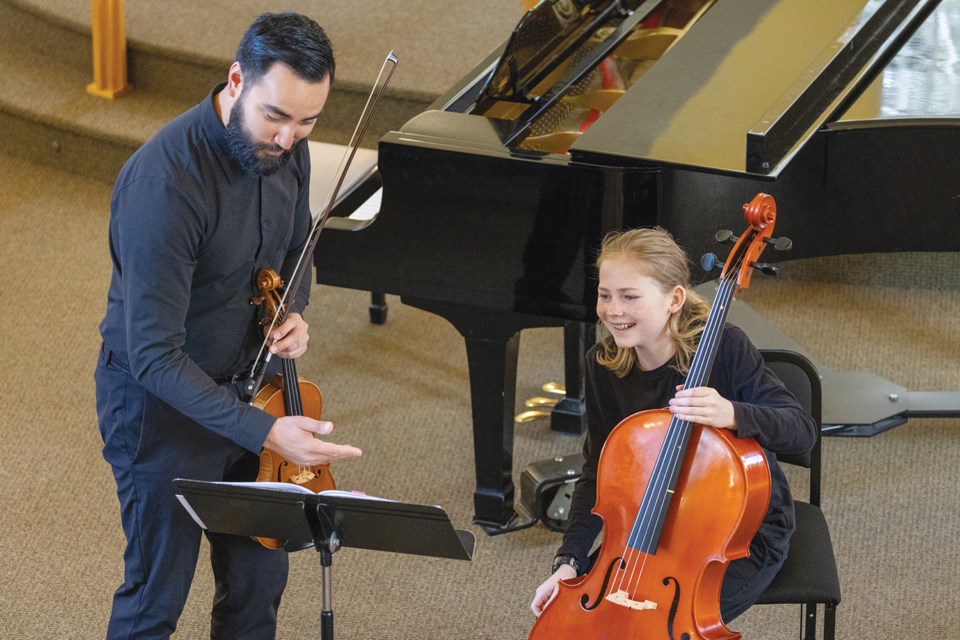Pianists and string players were in the spotlight during the first week of the Sunshine Coast Festival of the Performing Arts.
Over 120 individual performances in the two disciplines took place during the opening sessions of the festival, which celebrates its 50th anniversary this spring.
“It was a treat,” said Laurel Kelly, the professional musician and piano teacher who adjudicated two days of keyboard performances on April 9 and 10. “What a wonderful bunch of pianists. Typically I start my writing right away, but for these performances, I couldn’t help myself but sit and listen and enjoy everything. I was just enthralled, like I was at a concert, not like I had a job to do.”
Kelly offered tips on performance and interpretation to an array of players ranging from junior baroque pianists Sophie Trinh, Lily Tultz and Toby Cavers to adult performer Penny Dunford, who performed Romantic and Post-Romantic numbers by Chopin and Debussy respectively.
When preparatory pianist Eleanor Robertson plucked out the melody for Twinkle, Twinkle, Little Star, the last note remained elusive. Kelly recognized an acute case of nerves and joined Robertson on the piano bench. She prompted the young artist to reprise the tune while she improvised complementary chords in the bass clef. The impromptu duet elicited vigorous applause from spectators at St. Hilda’s Anglican Church, the venue for the festival’s musical performances.
Canadian composers enjoyed special prominence, particularly Nova Scotia-born Anne Crosby Gaudet. Pieces by Guadet were performed by Lily Tultz, Ally Sato and Poppy Mackenzie Arnet. Katherine Hume appeared twice in the Family Duo category, playing duets with her son Leif Montgomery and daughter Allegra Montgomery respectively.
Two pianists delivered original compositions: Taho Shinagawa performed Kuragé, a shimmering tribute to the jellyfish and Daniel Claudepierre debuted his meditative jazz work Ballad.
Bowed string performances on April 15 and 16 were adjudicated by Tyson Doknjas, a violinist with the Victoria Symphony and regular contributor to the Vancouver Symphony Orchestra and Pacific Opera Victoria. Doknjas highlighted the influence of dance forms on string repertoire (tarantellas, gigues, sarabandes).
Three cello soloists — Erin Payne, Erin Payne, and Esmé Woolliams — recapitulated their richly emotive selections from Bach’s cello suites first presented at Bach Fest earlier this year. Elgar’s evergreen Salut d’Amour received interpretations on both violin (by Madeleine Malcolmson) and cello (by Miyo Shinagawa).
Shinagawa herself performed three back-to-back numbers for the senior concert group category, rendering pieces by Bach, Vivaldi and French composer Daniel van Goens with effortless sublimity.
A surprising entry by Gord Beynon (the mandolin is plucked, not bowed) presented Bach’s Partita No. 1 on an instrument not yet invented in the composer’s time.
The bowed string category also included a Purcell arrangement by the Quartetto Uno quartet, and two piano-and-violin duos: Poppy Mackenzie and Isla Mackay, and Anna Reznick and Madeleine Malcolmson (who concluded the bowed string category with Astor Piazzolla’s fiery Libertango).
The first Sunshine Coast Festival of the Performing Arts took place in 1974, the result of determined efforts by music teachers Mary Brooke and Aletta Gilker. Brooke and Gilker enlisted the partnership of educator George Cooper and the Kiwanis Club to launch the annual event. As the festival grew in size, adjudicated recitals were held at the Twilight Theatre (now the Gibsons Cinema) at the gift of its proprietors, Raymond and Pamela Boothroyd. In the 1990s, performances moved to the Raven’s Cry Theatre in Sechelt. The Raven’s Cry Theatre was the beneficiary of festival fundraising to purchase a grand piano, which was finally realized on the occasion of the 1999 event.
Performances will continue in this year’s festival in categories dedicated to folk music, speech arts, vocals, choirs, band and dance until April 25; a highlights concert takes place on May 11 at the Heritage Playhouse in Gibsons. Browse to coastfestival.com and coastaldancefestival.com for full schedules.
Correction: An earlier version of this story mislabeled the festival participants in the photo. We regret the error.




